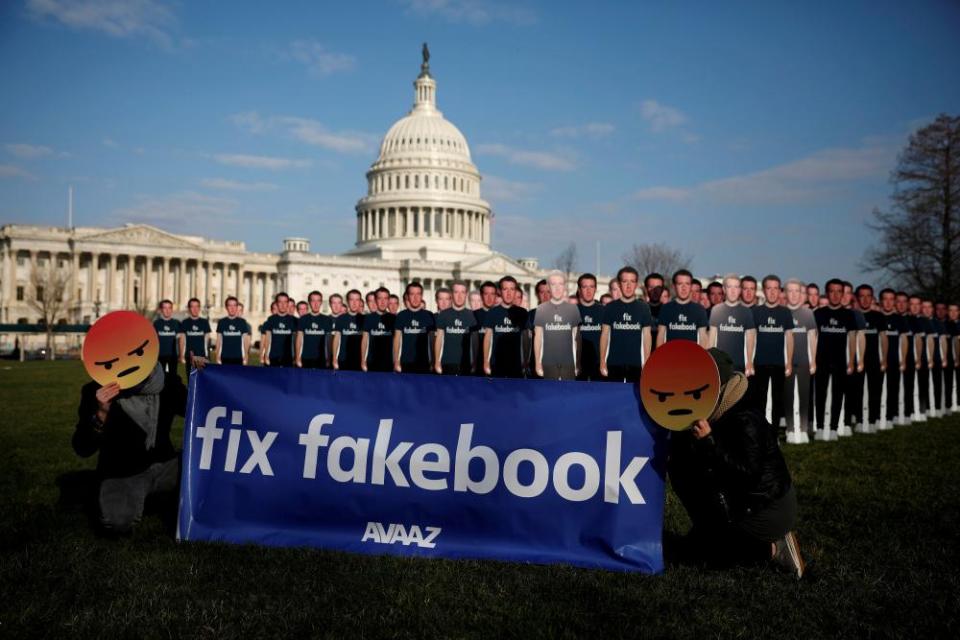How academic at centre of Facebook scandal tried – and failed – to spin personal data into gold

As Aleksandr Kogan goes before parliament on Tuesday to account for his role in the controversial harvesting of Facebook data that was later used by Cambridge Analytica, he leaves behind him two unsuccessful companies and a once-promising academic career.
Kogan was a young psychologist fresh off a post-doctoral fellowship when he earned an appointment as a lecturer at Cambridge University in 2012 – a coup for any academic. Just six years later, the erstwhile Dr Spectre has been maligned in the press, mocked for his eccentric name change, and banned from the social network that he thought would provide him with the data to advance his research.
He has also brought unwelcome scrutiny of Cambridge University’s other researchers, prompting Facebook’s Mark Zuckerberg to tell the US Congress that the company is looking into “whether there was something bad going on at Cambridge University overall”.
In a recent interview with 60 Minutes, Kogan apologised for his role in the controversy, saying: “I think that the core idea we had – that everybody knows, and nobody cares – was wrong. For that, I am sincerely sorry.”
The story of Kogan’s commercial ventures reveals a world where companies traded in the currency of personal data. As Kogan declined to speak on the record with the Guardian for this article, this account is based on public records, interviews with Kogan’s associates, and emails seen by the Guardian.
It was at Cambridge, home of the renowned Psychometrics Centre, that Kogan became the crucial link between SCL Elections (an entity related to Cambridge Analytica) and Facebook’s vast troves of personal data. Two other Cambridge researchers, Dr Michal Kosinski and Dr David Stillwell, had pioneered the use of Facebook data for psychometric research with a Facebook quiz application, the myPersonality quiz, which launched in 2007. Kogan built his own personality quiz application in 2013, and used it for academic research, according to an email he sent to Cambridge colleagues in March.
Kogan was introduced to SCL Elections in January 2014 by a Cambridge psychology PhD student, according to emails seen by the Guardian.
SCL offered Kogan the holy grail for a social scientist: money to pay people to take his surveys. And Kogan had something SCL wanted: a Facebook application that worked under the social network’s pre-2014 terms of service, which allowed app developers to harvest data not only from the people who installed the app, but from their friends. “New applications are not able to access friend networks and no other psychometric profiling applications exist under the old Facebook terms,” the contract that SCL and Kogan’s company ultimately signed reads.
Between that first meeting and 4 June 2014, when the contract was signed, Kogan tried to recruit Stillwell and Kosinski to work on the SCL project with him. The negotiations broke down, and John Rust, the director of the Psychometrics Centre, accused Kogan of using Kosinski’s and Stillwell’s ideas for a “get rich quick” scheme. Kogan denied the charges, defending his work as original and accusing Rust in turn of “bullying”.
Speaking to the Guardian on a previous occasion, Kogan said: “When we initially envisioned doing the project with SCL, we had planned for it to be collaboration with Michal Kosinski and David Stillwell at the Psychometrics Centre.
“Even though I very much wanted to work with Michal and David, SCL felt that their position of a fee of $500,000 for the modelling portion of the project was not warranted. And so SCL asked me to remove Michal and David from the project.
“I did my best to find a middle road, but neither SCL nor Michal [or] David ended up moving to a middle ground.
“John Rust, the director of the Psychometrics Centre, then made a complaint to the university on behalf of Michal and David … and even though the university’s investigation resulted in no support for John’s claims, I still lost valuable collaborators that I enjoyed working with.
“In the end, I believe the Psychometrics Centre wanted to get back on the project, even though SCL had moved on based on their negative experience with them.”

At the end of May 2014, Kogan established the company, Global Science Research Ltd (GSR) that signed the contract with SCL Elections. Kogan’s co-director of GSR, and a witness to the contract’s execution, was Joseph Chancellor, a post-doctoral student in Kogan’s lab who is currently employed by Facebook. Kogan described Chancellor as an equal partner in the enterprise to 60 Minutes, saying: “We did everything together”. A spokesman for Facebook defended the company’s disparate treatment of the business partners, saying of Chancellor: “His work at Facebook is unrelated to what he did previously.”
Despite Rust’s accusations, the contract did not offer any financial remuneration to Kogan and Chancellor. Instead, they would be rewarded with data – both the Facebook data and an additional dataset of 1 million citizens of Trinidad and Tobago – which they would go on to attempt to spin into both academic and commercial gold. The Guardian understands that Kogan never received the Trinidad and Tobago dataset.
In August 2014, GSR added another director, who described himself as the chief financial officer and co-founder of GSR on his LinkedIn profile in December 2014.
“The company owns a massive data pool of 40+ million individuals across the United States – for each of whom we have generated detailed characteristic and trait profiles,” the LinkedIn profile stated at the time.
The profile described two products being offered by GSR: Peek, a tool to help businesses understand the “psychological, economic, ethnographic knowledge” profiles of their customer bases, and SurveyExtender, a tool to forecast survey results.
When the Guardian contacted Kogan in December 2014, he affirmed by email that GSR was developing the two products, which he compared, respectively, to CubeYou and SurveyMonkey. (Facebook suspended CubeYou from its platform in April 2018, following inquiries about data usage from CNBC).
It would be another year before the Guardian published an article revealing that Cambridge Analytica was using the Facebook data to target voters for Ted Cruz’s presidential campaign.
In the meantime, Kogan continued to work with the Facebook data, both for academic research and for GSR, which had a website promoting its tools to “optimise marketing strategies with the power of big data and psychological sciences”. He maintained a close relationship with Facebook, which provided him with an anonymised, aggregate dataset of 57 billion Facebook friendships for research purposes. He told 60 Minutes: “I even did a consulting project with Facebook in November of 2015, and what I was teaching them was lessons I learned from working with this dataset that we had collected for Cambridge Analytica, so I was explaining, ‘Here’s kinda what we did, and here’s what we learned, and here’s how you could apply it internally to help you with surveys and survey predictions and things like that.’”
In June 2015, Kogan also established a Delaware corporation, Philometrics, which remains active and of which he is CEO.
Chancellor resigned as a director of GSR in September 2015 and was hired by Facebook a few months later. According to public documents, however, he remained a partial owner of the company through May 2016.
After the Guardian’s publication of the December 2015 exposé, Facebook contacted Kogan and required him to delete the GSR data. The company also ceased collaborating with Kogan on research related to the 57 billion friendship data set. The end result was a major setback for Kogan and especially his graduate students, who had to abandon about 18 months of work.

In March 2016, Kogan wrote to Rust and Stillwell of the Psychometrics Centre to request access to the myPersonality dataset for one of his PhD students, who had been using the GSR dataset for his dissertation, according to emails seen by the Guardian.
Rust rejected Kogan’s appeal, writing: “I think it completely inappropriate that we should have anything more to do with you or your companies.”
With Kogan’s academic career sputtering, he appears to have turned his attention to building SurveyExtender into a viable product, now under the auspices of Philometrics. The Guardian understands that the version of SurveyExtender marketed by Philometrics did not use the GSR Facebook data.
Kogan moved to San Francisco, though he has maintained his position at Cambridge in order to supervise his remaining PhD students. His company attracted the attention of at least one investor, the media monitoring firm Meltwater. In his 2017 book Outside Insight, Meltwater’s founder Jørn Lyseggen interviewed Kogan, who was using his married name, Alex Spectre, at the time. Lyseggen describes Philometrics as a “pioneer” in the realm of garnering consumer insights and competitive intelligence from social media data.
In October 2017, GSR was dissolved. That same month, Kogan registered a UK business, Philometrics Ltd, of which Kogan was CEO and the US Philometrics was the sole shareholder.
Kogan and at least one of his employees worked out of Meltwater’s San Francisco office for a time. A spokeswoman for Meltwater confirmed that the company is a minority investor in Philometrics and that a Philometrics employees “contributed time on an internal Meltwater pilot project attempting to predict future values of cryptocurrencies”.
The company appears to have soured on Kogan, however.
“Meltwater invested in Philometrics because of Alex Spectre’s impressive background as a professor from Cambridge University and the prospect of him recruiting valuable talents he knew from Cambridge,” a spokeswoman told the Guardian by email. “There were no Facebook data in the company Meltwater invested in.”
She continued: “Alex never succeeded in building Philometrics into a successful company. As far as we understand Philometrics is today a company with very limited operations and employees.”

 Yahoo News
Yahoo News 
